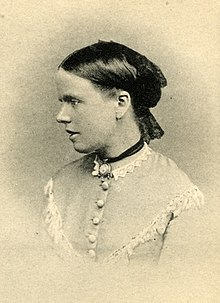Frances Julia Wedgwood
Frances Julia "Snow" Wedgwood (9 July 1833 – 26 November 1913) was an English feminist novelist, biographer, historian and literary critic. She was described as "a young woman of extreme passions and fastidious principles"[1] and "at once a powerful reasoner and an inexorable critic of reason".[2]
Frances Julia Wedgwood | |
|---|---|
 | |
| Born | 9 June 1833 |
| Died | 26 November 1913 (aged 80) |
| Nationality | English |
| Other names |
|
| Occupation | novelist, biographer, historian and literary critic |
| Movement | First-wave feminism |
| Parent(s) |
|
| Relatives |
|
Life and career
Childhood
Wedgwood was the daughter and the eldest of the six children of Hensleigh Wedgwood and his wife Fanny Mackintosh, the daughter of Sir James Mackintosh. She was a great-granddaughter of the potter Josiah Wedgwood and niece of Charles Darwin. Her strong intellect was apparent early and she taught herself Latin, Greek, French, German and drawing, however her only formal education was at the age of thirteen at Rachel Martineau's school in Liverpool.[3] Her mother ran a salon in Cumberland Place attended by Macaulay, Thackeray, F. D. Maurice, Ruskin, and Carlyle.[3]
Early career and fictional works
Wedgwood was acknowledged as "the cleverest of her generation" in the extended Wedgwood–Darwin–Mackintosh family and she acquired renown as a "brilliant conversationalist with a passion for scientific and theological debate".[3] In her twenties she wrote the novels "An Old Debt" and "Framleigh Hall" addressing "intellectual conflict, confused gender roles, and ill-starred sexual passion", which were well received by the public.[3] Faced with her father's disapproval of her writing skills and topics, however, Wedgwood abandoned a third novel despite encouragement by Mrs Gaskell, whom she assisted in research for The Life of Charlotte Brontë (published in 1857). She concluded that "she had no imaginative powers" and that her "mind was 'merely analytical'".[4]
Obstacles and non-fictional works
Due to expectations on an unmarried woman in a large family and by her chronic deafness, Wedgwood's work was severely impeded. "Her reading and writing were done between five and seven in the morning"[3] and most of her life was spent caring for ill relatives and for relatives' children. She published some book reviews while caring for a brother, then in 1861 an article on the theological significance of On the Origin of Species. In response Charles Darwin wrote her a letter stating "I must tell you how much I admire your Article (...) I think that you understand my book perfectly, and that I find a very rare event with my critics",[5] expressing himself inspired to – and challenged by – further thought on the topics she had brought up.
She was a close friend of Robert Browning for some years, correspondence with whom survives for the years 1863 to 1870.[3]
In 1870, Wedgwood published a much lauded book on the life and historical significance of John Wesley. She set up her own household in Notting Hill and in the following years she helped Charles Darwin translate the works of Linnaeus as well as publishing an array of clear and precise articles on science, religion, philosophy, literature, and social reform. At her London home, Wedgwood also worked on "a history of the evolution of ethics in the great world civilizations, from earliest antiquity down to the scientific positivism and theological modernism of the mid-nineteenth century",[3] which was published as "The Moral Ideal: a Historic Study" in 1888. The success of this work led to the republication of her novels.
Upon the death of her mother in 1889 she gave up her own house to care for her father.[3]
Five years later, she published a follow-up work to "The Moral Ideal" – "The Message of Israel" – with the aim of re-interpreting the Judaeic tradition critically in the light of ‘modernism’. In 1909 a collection of her major articles was published. She was also persuaded to work on a biography of her great-grandfather, which was finished after her death by Professor C. H. Herford.[3]
Religion and later life
Throughout her life Wedgwood was interested in the boundaries between scientific knowledge and religious belief and was influenced by James Martineau, Alexander John Scott, and especially Thomas Erskine. In her later years she donated extensively for the construction and extension of Church of England churches. She had been active in the anti-vivisection movement since the 1860s and bequeathed it much of her fortune upon her death on 26 November 1913.[3]
Bibliography
- An Old Debt (as Florence Dawson), 1858
- Framleigh Hall, 1858
- Life of John Wesley, 1870
- The Moral Ideal, 1888 and 1907
- The Message of Israel, 1894
- Nineteenth Century Teachers, 1909
References
- B. Wedgwood and H. Wedgwood 1980, p. 259
- J. Wedgwood, Personal Life, xx, via ODNB
- Harris, Jose (2011). "Wedgwood, (Frances) Julia (1833–1913)". Oxford Dictionary of National Biography (online ed.). Oxford University Press. doi:10.1093/ref:odnb/52808. (Subscription or UK public library membership required.)
- Wedgwood and Wedgwood, 261–2 via ODNB
- "Letter from Darwin to Wedgwood, 11 July 1861". Darwin Correspondence Project.
External links
- Frances Julia Wedgwood, 1833–1913 (Wedgwood, Snow) : Darwin Correspondence Project – with links to her letters to and from Charles Darwin.